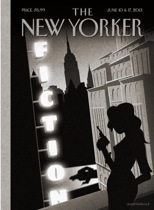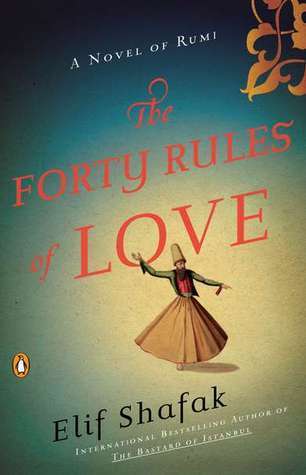Clifford Garstang's Blog, page 78
June 14, 2013
Theater: “Becky Shaw” by Gina Gionfriddo
My theater binge continues. For tonight’s show, I trekked up to Bethesda–not exactly a hardship, since my hotel is close to the Red Line, which has a major stop in the heart of Bethesda. I got up there early enough that I could browse in Barnes & Noble a little and also stop for dinner. I picked a very nice wine bar & cafe called Vino Volo, which I highly recommend. (Turns out, it’s a chain–I’d definitely check it out in other cities.)
Then I strolled over to the Round House Theater. I was early, so I was one of the first to take my seat for the performance of Becky Shaw. The show was very different from “Stupid Fucking Bird,” which I saw last night, at least in style. While that was meta-drama, and somewhat radical in form, this play was pure realism. There were some similarities, though–a domineering mother who takes a young lover; a couple of suicidal characters (one who dresses in black); a struggling writer (although one is angst-ridden and the other is not).
Though titled “Becky Shaw,” the central character of the play is really Suzanna, played by Alyssa Wilmoth Keegan, who is one of the reasons I went to see this play. Alyssa was formerly a member of the repertory company at the American Shakespeare Center in Staunton, so I’ve seen her perform often and have met her. (She’s married to Thomas Keegan, who is another former member of the ASC company and the son of my friend James Keegan, a long-time stalwart of the company, so I feel as though I know her better than I actually do.)
At the beginning of the play, Suzanna is grieving over the death of her father and the discovery that her mother has taken a young lover. She also obviously has feelings for Max, who had been raised from an early age by her parents and so is like a brother to her. Enter Becky Shaw, a marvelous character who is the catalyst for much of what happens in the play. She’s not exactly Iago, but she’s similarly determined.
Alyssa and the rest of the cast were terrific, and I thoroughly enjoyed the play. I confess that I was not so crazy about the ending, I shared with the people sitting around me some surprise that the show was actually over when the final scene faded to black. I’m not sure how I would have ended the play, however. I’ll give that some thought.
The show runs through June 23, so you’ve only got another week to catch it.
Theater: “Stupid Fucking Bird” by Aaron Posner

I seem to have developed a renewed interest in the theater. Years ago, in graduate school, I read a lot of drama, although I didn’t see so many productions. When I was teaching freshman composition, we also read some plays and watched a few filmed productions, and I enjoyed discussing these with the students: Chekhov, O’Neill, Stoppard, and others.
And, of course, I am a regular at the American Shakespeare Center. A play by a modern playwright is an anomaly there, though. Mostly they do plays by Shakespeare and his contemporaries.
But I’m headed off to the Sewanee Writers’ Conference in a few weeks to attend the playwriting workshop. And in preparation for that I have been writing a play. It occurred to me recently, then, that I really ought to see some modern plays. I thought of running up to New York, and I may still do that later this summer or in the fall, but the opportunity arose to visit DC this week, and so I’m turning it into a theater adventure. First up was a trip to Woolly Mammoth for their production of Aaron Posner‘s Stupid Fucking Bird.
Loved it. The theater is a wonderful, intimate space. And the play, which is a very loose adaptation of Chekhov’s The Seagull, is exciting to watch. One thing that I found fascinating was the play’s awareness of itself as art, with self-referential moments sprinkled throughout, such as where the characters speak to the audience not as imaginary participants in the play but as audience members at a play. The dialogue is funny and poignant, the characters all quite vividly drawn. It surely helps that the performances were all outstanding, too.
After the play, the group I was with sat down with the playwright for a talk. (I went with the Northwestern University Club of DC and Posner is a graduate of NU’s Performance Studies program.) That was fascinating for me and I enjoyed hearing him talk.
The play only runs until the 23rd of June, so catch it while you can.
I’m heading to another show in DC tonight . . .
June 12, 2013
The New Yorker Summer Fiction Issue: “Scenes of the Crime” by Cormac McCarthy
 “Scenes of the Crime” by Cormac McCarthy
“Scenes of the Crime” by Cormac McCarthy
Excerpted and adapted from the screenplay for “The Counselor,” a Ridley Scott film coming out later this year. What’s interesting here is that there is no dialogue in the excerpt. Presumably the characters do talk at some point, but this is all landscape and action. Bloody action, as you might expect from McCarthy’s work. We start in a Mexican garage where a drum is being welded inside a propane tank; then we follow it across the border, and then we see violence and death in its wake. And then we see the drugs being removed from the drums.
Fascinating to see this in the fiction issue. Beyond that, not much to say.
June 11, 2013
The New Yorker Summer Fiction Issue: “Happy Trails” by Sherman Alexie
 “Happy Trails” by Sherman Alexie
“Happy Trails” by Sherman Alexie
This might be my favorite piece in the issue. The story begins: “Forty-one years ago, my uncle Hector said he was hitchhiking to Spokane, walked out the door, and disappeared.” Nice start. So what became of uncle Hector? The narrator spends the story speculating, and along the way recounts other losses the family has experienced. But he decides it’s time to “bury” Hector, so a memorial is planned and held, with an open, empty casket. Was Hector a great man? “Actually, Hector was only sometimes great. But we need to make the dead better people than they were, because it makes us look better for loving them.” (This is the kind of simple, almost child-like logic that Alexie is so good at.)
The reason this story fits into the summer crime issue is that the narrator speculates that Hector has disappeared because of foul play. But of course he doesn’t know, and no one knows.
June 10, 2013
The New Yorker Summer Fiction Issue: “Brotherly Love” by Jhumpa Lahiri
 “Brotherly Love” by Jhumpa Lahiri
“Brotherly Love” by Jhumpa Lahiri
We learn from the Q&A with Jhumpa Lahiri that “Brotherly Love” is an excerpt from Lahiri’s new novel, forthcoming later this year. Although this worked reasonably well as a story (except for the long time period it covers) I’m glad to hear it, because these are quite interesting characters and I’d willingly read more about them. Sounds like a good novel and an interesting time in India’s history.
Two brothers in Calcutta, born 15 months apart. The brothers remain close even though as they grow up they become very different. The elder brother goes to the US to study; the younger stays home and is politically active in a Maoist group. Against custom, the younger brother marries a woman of his own choosing, before his elder brother. But then he dies (he is, in fact, killed by the police). The elder brother comes home when he hears about his brother’s death. What’s particularly interesting then is the elder brother’s relationship with his brother’s widow.
So, this is quite an interesting novel excerpt that is, apparently, about the Calcutta area. The politics of the younger brother are quite interesting, with his Maoist leanings, in contrast with the older brother’s apolitical behavior. (In the US, he is tempted to join protests against the Vietnam war, but decides it isn’t his place.) He is, however, both admiring of his younger brother’s commitment and angry that it got him killed. His love for his brother is, in large part, what then attracts him to Gauri, his sister-in-law.
It’s long, but worth the read, and is available for free.
Holding Forth: Story Cycles and Novels in Stories
 I recently had business in North Carolina and was invited to participate in a gathering at the home of Marjorie Hudson, author of the excellent linked story collection Accidental Birds of the Carolinas. (Seriously, if you haven’t read this book, you really should.)
I recently had business in North Carolina and was invited to participate in a gathering at the home of Marjorie Hudson, author of the excellent linked story collection Accidental Birds of the Carolinas. (Seriously, if you haven’t read this book, you really should.)
Marjorie gathered a number of her friends and students together for the occasion and asked me to speak about writing process, my books, and generally whatever came to mind. I decided to get a little more specific than that, however, and so I shared my thoughts on linked story collections and novels in stories, a subject about which I’ve given a lot of thought.
One of the writers joining the session was Michele Berger, who blogs about creativity. She wrote about her reaction to the gathering here: Learning about Story Cycles and A Novel Told in Stories. She does a great job of summarizing our discussion, so I thought I’d share that with you here. Please check out her blog, a great resource on creativity.
The New Yorker Summer Fiction Issue: “Slide to Unlock” by Ed Park
 “Slide to Unlock” by Ed Park
“Slide to Unlock” by Ed Park
Clever. We don’t know why until the end of the story, but the narrator (in second person) is reviewing his life in passwords, all the life events that he might have used to come up with an unforgettable password. “If you could type out all your passwords, their entire silent history, they could fill a book you could read in a minute.”
I won’t say why this is happening, except to say that the ending might actually justify the use of the second person here, which I normally detest. Here, though, the narrator could very well be looking at himself as if from another plane of existence, so maybe the POV works. It’s a fun, fast read.
June 9, 2013
The New Yorker Summer Fiction Issue: “Rough Deeds” by Annie Proulx
 “Rough Deeds” by Annie Proulx
“Rough Deeds” by Annie Proulx
In New France (Canada) in the mid 18th Century, Duquet does business with an Englishman to expand his trade. He acquires vast timber holdings in Maine and then has to defend the timber against poachers, including a man named McBogle. Duquet encounters some poachers and kills one, apparently McBogle’s son. Much later, Duquet is captured by McBogle and is brought to a sawmill. The end of the story hints at a gruesome demise for Duquet.
This didn’t seem like a short story to me, but there’s nothing in the magazine that suggests otherwise. It covers a long period of time, although the interesting bits are the encounters between Duquet and McBogle. Was it really necessary to give so much of Duquet’s backstory? Maybe. Especially if this is part of something longer. But in a true short story, probably not.
June 8, 2013
The New Yorker Summer Fiction Issue: “An Inch and a Half of Glory” by Dashiell Hammett
 June 10 & 17, 2013, Summer Fiction Issue: “An Inch and a Half of Glory” by Dashiell Hammett
June 10 & 17, 2013, Summer Fiction Issue: “An Inch and a Half of Glory” by Dashiell Hammett
The theme of the Summer Fiction Issue is “Crimes & Misdemeanors” and the issue features work by Dashiell Hammett, Annie Proulx, Ed Park, Sherman Alexie, Cormac McCarthy, and Jhumpa Lahiri. I’ll discuss them in that order over several posts.
“An Inch and a Half of Glory” by Dashiell Hammett
Earl Parish works for the railroad. One day he rescues a child from a burning building (although it isn’t clear the child really needed rescuing). He gains some notoriety for his deed, and a very brief mention in the newspaper (hence the title). Although he knows the truth, he lets the attention go to his head and ends up losing his job for poor performance. He has trouble holding onto a job then and sees the Fire Department as a natural place for him. But he can’t pass the physical, so he’s out of luck. Then he comes across another burning building. This time, hoping to redeem himself, he rescues a kitten, but instead of taking credit for it he gives a fake name and address. Then he takes a menial job, hoping to get out of town.
And that’s about it. Hammet does a great job letting Parish deteriorate with arrogance and then get a rude awakening. In the end, though, it seems Parish is getting another chance. An old-fashioned story.
June 5, 2013
2013 Reading: The Forty Rules of Love by Elif Shafak
 The Forty Rules of Love: A Novel of Rumi by Elif Shafak
The Forty Rules of Love: A Novel of Rumi by Elif Shafak
I read this for one of the book clubs I participate in, and I was keen to read it because several years ago I had read Shafak’s The Bastard of Istanbul, which I liked very much and commented on here.
I liked this book, although probably not as much as the previous one. This is two books in one: the frame story is about Ella, a Massachusetts housewife (and, suddenly, a reader for a literary agency) and Aziz, and also the inner story which is the book Aziz has written about Rumi and his companion Shams.
The frame story is a bit shallow. Ella is unhappy in her marriage and she finds herself attracted to Aziz. The inner story, on the other hand, is worth the price of admission. It tells of how Shams, a Sufi dervish, came to be Rumi’s companion and helped Rumi become the great poet he is known to be today, which happened in the mid-13th Century. That part of the story was compelling, although it’s told from too many points of view: Rumi, Shams, Rumi’s 2 sons, Rumi’s wife, a harlot, a killer, a drunk, a beggar, etc.
Still, I’m very glad I read the book and would recommend it.




